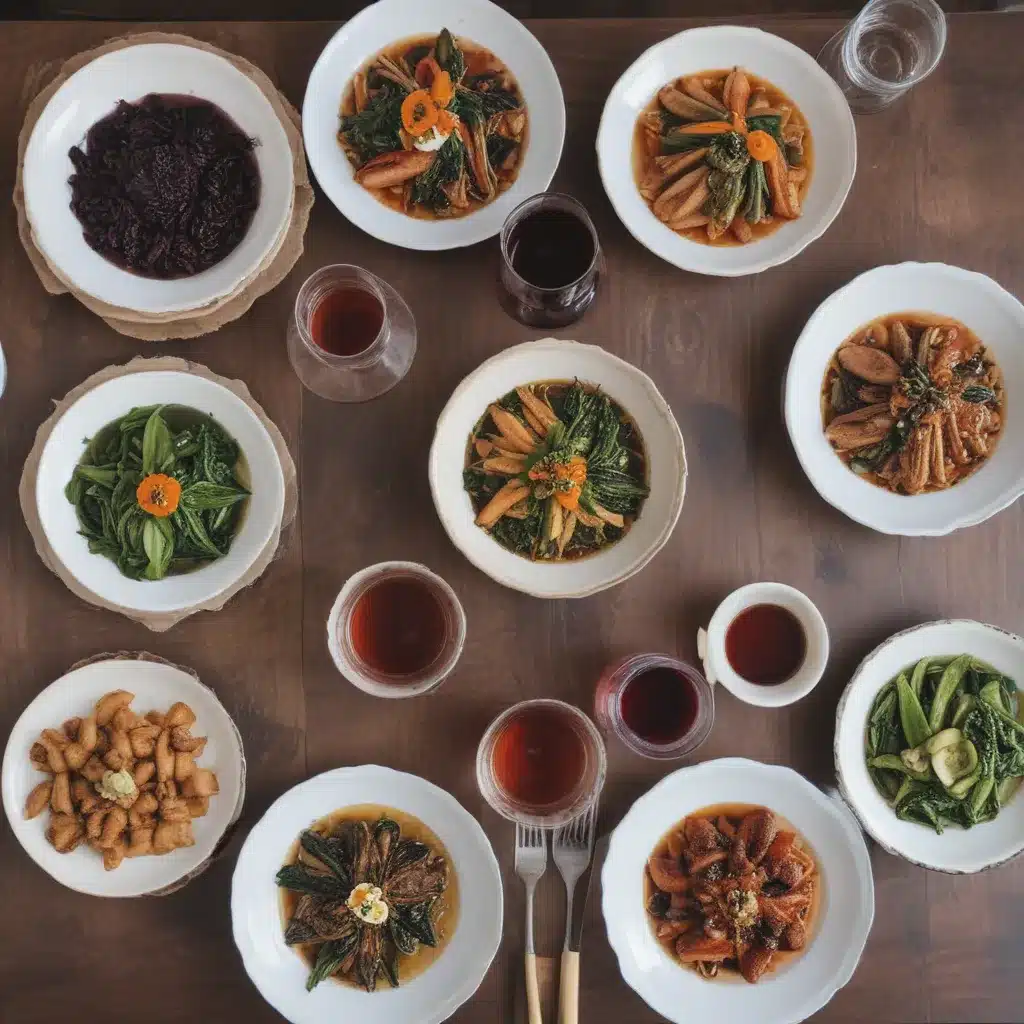
Discovering the Vibrant Vegetarian Side of Korean Cuisine in Boston
As a self-proclaimed foodie and lover of all things Korean, I have long been enamored with the rich tapestry of flavors that define this captivating cuisine. But, it wasn’t until I stumbled upon a hidden gem of a restaurant in the heart of Boston’s bustling Koreatown that I truly began to appreciate the dynamic, vegetarian-friendly offerings that Korean food has to offer.
You see, I had always associated Korean cuisine with its legendary barbecue dishes, hearty stews, and the umami-packed fermented delights of kimchi. While these iconic staples certainly hold a special place in my heart (and stomach), I couldn’t help but feel that I was missing out on a whole other side of this culinary tradition. That is, until I discovered Korean Garden Boston, a restaurant that has not only expanded my horizons but has also challenged my preconceptions about what Korean food can be.
As I stepped through the doors of this unassuming eatery, I was immediately struck by the vibrant, plant-based dishes that adorned the menu. Gone were the familiar sights of sizzling meats and pungent seafood – in their place, a veritable feast for the senses that celebrated the beauty and versatility of fresh, local produce.
Embracing the Vegetable-Forward Ethos of Korean Cuisine
One of the first dishes that caught my eye was the Japchae, a classic Korean noodle dish that traditionally features stir-fried glass noodles, vegetables, and sometimes beef. But at Korean Garden Boston, the chefs had put a delightfully vegetarian spin on this beloved classic, substituting the beef with a medley of vibrant, seasonal veggies that danced across the plate in a symphony of colors and textures.
As I took my first bite, I was immediately struck by the depth of flavor – the sweetness of the noodles, the earthy notes of the mushrooms, the satisfying crunch of the carrots, all bound together by a savory-sweet sauce that had me reaching for more. It was a revelation, a testament to the idea that Korean cuisine can be just as captivating and satisfying without relying on meat.
But the culinary adventure had only just begun. The next dish that caught my eye was the Japgokbap, a Korean rice bowl that traditionally features an array of vegetable banchan (side dishes) arranged around a bed of steamed rice. At Korean Garden Boston, the chefs had taken this classic dish and elevated it to new heights, crafting a veritable garden of delights that celebrated the natural sweetness and crunch of raw and lightly cooked vegetables.
As I eagerly dug in, I found myself transported to the heart of a lush, Korean countryside – every bite a harmonious blend of textures and flavors that left me feeling nourished and invigorated. The kimchi, with its signature tang and fiery kick, provided a delightful counterpoint to the delicate, earthy mushrooms and the crisp, fresh greens. It was a masterclass in the art of balancing flavors and textures, and a testament to the deep respect and reverence that Korean cuisine holds for the humble, yet extraordinary vegetable.
Exploring the Versatility of Tofu in Korean Vegetarian Dishes
But the true revelation came when I sampled the Dubu Jorim, a dish that showcased the incredible versatility of tofu in Korean cuisine. At Korean Garden Boston, the chefs had transformed this humble ingredient into a culinary work of art, braising the tofu in a rich, savory-sweet sauce that had me questioning everything I thought I knew about this often-overlooked protein.
As I savored each bite, I marveled at the way the firm, yet silky texture of the tofu had perfectly absorbed the complex flavors of the sauce – a delicate balance of salty, sweet, and umami that danced across my palate. The dish was further elevated by the addition of crisp, vibrant vegetables that added both visual appeal and a satisfying crunch.
It was then that I realized the true genius of Korean vegetarian cuisine – the way it elevates humble, plant-based ingredients into dishes that are not only deeply nourishing, but also utterly captivating to the senses. The chefs at Korean Garden Boston had managed to take these familiar ingredients and transform them into something wholly unique and unforgettable.
Pairing Vegetarian Korean Dishes with Natural Wines
But the culinary exploration didn’t stop there. As I delved deeper into the menu, I discovered that the magic of Korean Garden Boston extended beyond just the food – it also extended to the carefully curated selection of natural wines that the restaurant had thoughtfully paired with their vegetarian offerings.
Now, I’ll admit, I’ve always been a bit of a wine enthusiast, but the idea of pairing natural wines with Korean cuisine was something that had never really crossed my mind. That is, until I sat down to enjoy a glass of the restaurant’s signature Chokak – a lively, mineral-driven natural Riesling that perfectly complemented the bold, umami-packed flavors of the Dubu Jorim.
As I swirled the wine in my glass, I couldn’t help but marvel at the way the bright acidity and subtle fruitiness of the Chokak cut through the richness of the braised tofu, while the wine’s earthy, almost saline-like notes echoed the depth of flavor in the dish. It was a revelation, a harmonious pairing that elevated both the food and the wine to new heights.
But the magic didn’t stop there. As I continued to explore the restaurant’s wine list, I discovered a whole world of natural wines that seemed to have been tailor-made to complement the vegetarian delights of Korean cuisine. From the crisp, aromatic Sauvignon Blanc that danced with the freshness of the Japgokbap, to the bold, tannic Cabernet Franc that seamlessly integrated with the umami-rich Japchae, each pairing seemed to unlock new layers of flavor and texture.
Celebrating the Culinary Artistry of Korean Garden Boston
As I sit here, reflecting on my experiences at Korean Garden Boston, I can’t help but feel a deep sense of gratitude and wonder. This unassuming restaurant has not only expanded my understanding of Korean cuisine, but has also challenged me to rethink the way I approach food and wine pairings.
Through their innovative, vegetable-forward dishes and their thoughtful selection of natural wines, the chefs and sommeliers at Korean Garden Boston have crafted a dining experience that is truly unforgettable. They have shown me that Korean cuisine is so much more than the well-known staples – it is a vibrant, ever-evolving canvas that celebrates the natural world in all its glory.
And as I savor each bite and sip, I can’t help but feel a deep sense of wonder and appreciation for the culinary artistry that has been so lovingly crafted within these walls. It is a testament to the power of food to nourish the body and the soul, and a reminder that the true magic of a great meal lies not just in the ingredients, but in the passion and expertise of those who bring it to life.
So, if you find yourself in the heart of Boston’s Koreatown, I urge you to venture beyond the familiar and discover the vegetarian wonders that await you at Korean Garden Boston. It is a journey of the senses, a celebration of the natural world, and a testament to the enduring power of great food and wine to bring people together. Trust me, your taste buds will thank you.
